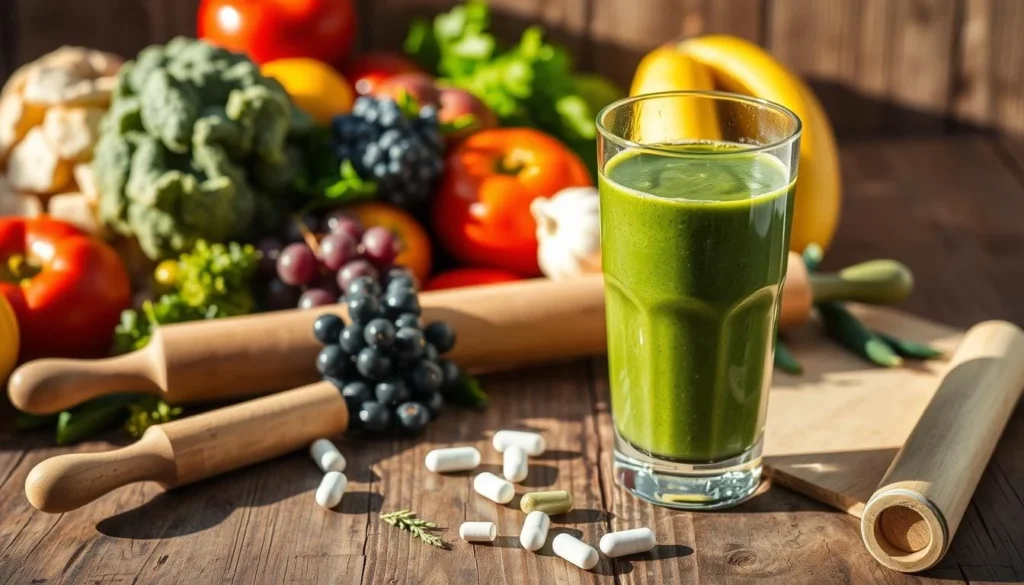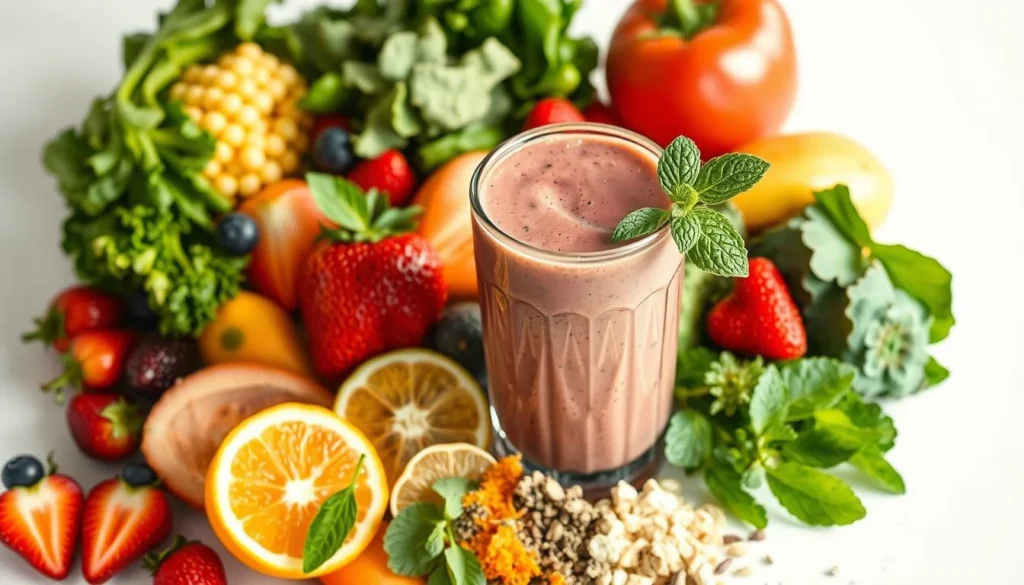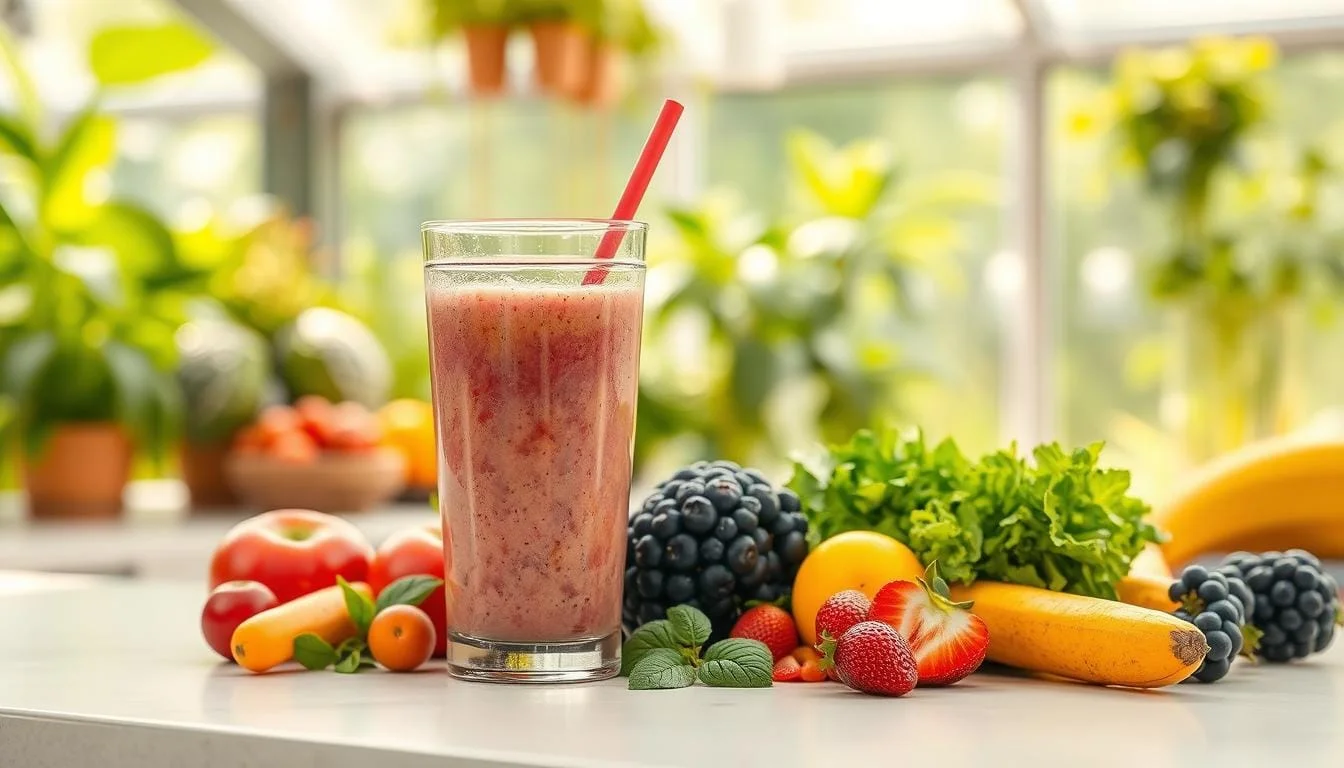Is Smoothie Healthy: Benefits of Blended Drinks
Table of Contents
Have you ever wondered if smoothies are truly a healthy choice? Every morning, millions of Americans reach for their blender. They hope to kickstart their day with a nutritious drink. The question “is smoothie healthy” has become increasingly important in our health-conscious world.
Smoothie nutrition goes far beyond a simple tasty beverage. These blended drinks offer a powerful way to pack essential nutrients into your daily diet. From the Juice Press Strawberry Banana Smoothie Kit providing 19 grams of protein to green smoothies packed with vital minerals, these drinks can transform your approach to nutrition.
Modern lifestyles demand convenient yet nutritious food options. Smoothies emerge as a perfect solution, helping you meet recommended daily fruit and vegetable intake with just one delicious drink. They’re not just a trend – they’re a practical approach to wellness that fits seamlessly into busy schedules.
Whether you’re an athlete, a working professional, or someone committed to healthier eating, understanding smoothie nutrition can be a game-changer for your overall well-being. Let’s explore how these blended drinks can potentially revolutionize your approach to daily nutrition.
Understanding What Makes a Smoothie
Smoothies are blended drinks full of nutrients. They can be fruit, vegetable, or protein smoothies. These drinks make it easy to get more nutrients every day. They mix different ingredients into one tasty drink, changing how we eat.
Smoothies are simple and flexible. They have basic parts that make them healthy and tasty.
Basic Components of Smoothies
- Liquid base (water, milk, plant-based alternatives)
- Fresh or frozen fruits
- Vegetables
- Optional protein sources
- Additional nutritional boosters
Common Smoothie Ingredients
Making a great smoothie means knowing the key ingredients. These add flavor and nutrition. In North America, many people don’t eat enough fruits and veggies. Smoothies are a great way to fix this.
| Ingredient Category | Examples | Nutritional Benefits |
|---|---|---|
| Fruits | Bananas, strawberries, blueberries | Vitamins, natural sweetness |
| Vegetables | Spinach, kale, lettuce | Antioxidants, minerals |
| Protein Sources | Greek yogurt, protein powder | Muscle recovery, satiety |
| Boosters | Chia seeds, hemp seeds | Omega-3, additional fiber |
Different Types of Smoothies
There are many types of smoothies for different needs. Fruit smoothies are sweet, vegetable smoothies are packed with nutrients, and protein smoothies help build muscle. You can adjust them to fit your diet.
Pro tip: For the best nutrition, mix fruits, veggies, and protein in your smoothie.
Is Smoothie Healthy: A Comprehensive Analysis
Whether a smoothie is healthy depends on several factors. It’s not just about the ingredients. The way you make it and its nutritional balance also matter.
Looking closely at what makes up a smoothie is key. Here are important things to think about:
- Ingredient quality
- Sugar content
- Fiber density
- Protein and nutrient balance
Smoothies made with whole foods can be very nutritious. They pack a lot of nutrients from fruits and veggies. The secret is choosing ingredients that are balanced.
| Smoothie Component | Nutritional Impact | Health Recommendation |
|---|---|---|
| Fresh Fruits | Vitamins, Antioxidants | Recommended Daily |
| Leafy Greens | High Fiber, Minerals | Essential Addition |
| Protein Sources | Muscle Support | 10-35% Daily Calories |
| Added Sugars | Calorie Increase | Limit or Avoid |
But, be careful with store-bought smoothies. They often have hidden sugars that can harm their health benefits. Making your own smoothie lets you control what goes in.
Nutrition experts say to mix fruits, veggies, proteins, and healthy fats for the best health benefits.
Whether a smoothie is healthy depends on your needs and what you put in it. Talking to a nutritionist can help you make a smoothie that fits your health goals.
Nutritional Value of Blended Drinks
Smoothies are more than tasty drinks. They are packed with vitamins, minerals, and nutrients. Knowing what’s in your smoothie helps you eat better.
Smoothies can greatly increase your vitamin intake. Many adults don’t eat enough fruits and veggies. Smoothies are a great way to fill this gap.
Essential Vitamins and Minerals
Choose ingredients that are full of nutrients for the best health benefits. Here are some key ones:
- Vitamin C from citrus fruits and berries
- Potassium from bananas and avocados
- Calcium from yogurt and milk
- Iron from leafy greens like spinach
Fiber Content in Smoothies
Fiber is important for digestion and feeling full. Use whole fruits and veggies for natural fiber. Old-fashioned oats and chia seeds add even more fiber.
| Ingredient | Fiber Content | Additional Benefits |
|---|---|---|
| Chia Seeds | 10.6g per ounce | Omega-3 fatty acids |
| Raspberries | 8g per cup | Antioxidants |
| Oats | 4g per half-cup | Protein and minerals |
Protein and Healthy Fats
A good smoothie has protein and healthy fats for a filling drink. Use Greek yogurt, tofu, or nut butters for protein. Avocados and flax seeds are great for healthy fats.
Nutrition tip: A meal replacement smoothie should contain 20-30 grams of protein and approximately 400-800 calories.
Health Benefits of Regular Smoothie Consumption
Smoothies are a great way to get more nutrients in your diet. Only 1 in 10 Americans eat enough fruits and veggies. Smoothies make it easy to get these important nutrients.
They help you reach many health goals. The American Heart Association says to limit added sugars. Homemade smoothies are a better choice than store-bought ones.
- Improved digestive health
- Enhanced immune function
- Better nutrient absorption
- Increased energy levels
Is smoothie healthy? It depends on what you put in it. Nutrient-dense smoothies can meet your body’s needs and cut down on unhealthy snack cravings. Mix fruits, veggies, and proteins for a balanced drink.
A 2018 study suggests consuming 30 or more different plant foods weekly can lead to a more diverse gut microbiome.
Smoothies help with many health goals. The USDA says to eat two and a half cups of veggies and two cups of fruits a day. Smoothies can help you meet this goal. Add calcium-rich ingredients for stronger bones and fruits for immune support.
| Smoothie Component | Health Benefit |
|---|---|
| Leafy Greens | Rich in vitamins and minerals |
| Berries | High in antioxidants |
| Chia Seeds | Supports heart and digestive health |
| Greek Yogurt | Provides protein and probiotics |
Drink smoothies slowly. It takes 15 minutes for your brain to feel full. Pay attention to how much you’re drinking. With smart choices, smoothies can be a tasty and healthy part of your diet.
The Role of Smoothies in Daily Diet
Smoothies are more than just tasty drinks. They are a key part of a healthy diet. They help with weight management and improve overall health.
Adding smoothies to your diet can change your eating habits. Many adults in the U.S. don’t eat enough fruits and veggies. Smoothies are a great way to fill this nutritional gap.
Meal Replacement Options
Protein smoothies can be a good meal replacement. They need to have the right mix of nutrients. This includes:
- Balanced macronutrient profile
- Adequate protein content (around 15-25 grams)
- Inclusion of fiber-rich ingredients
- Moderate calorie count
Pre and Post Workout Nutrition
Protein smoothies are great for athletes and fitness lovers. They help with performance and recovery. The Juice Press Blue Magic Protein Smoothie Kit is a good example. It has 23 grams of protein and 65 essential nutrients.
Weight Management Support
Weight loss smoothies can help with body composition. To make them effective, follow these tips:
- Controlling portion sizes
- Selecting low-sugar ingredients
- Incorporating protein to increase satiety
- Balancing calorie intake
Pro tip: Choose smoothie ingredients that support metabolism and provide sustained energy without excessive sugar.
Learning to make nutrient-dense smoothies can be a game-changer. They can become a powerful tool in your health journey.
Potential Drawbacks and Considerations

When we think about whether smoothies are healthy, we must look at the downsides. Smoothies are packed with nutrients, but they can also have hidden risks for our health and diet.
Sugar in smoothies is a big worry. Many smoothies, both store-bought and homemade, have too much sugar. This can cause a spike in blood sugar and add extra calories. The American Heart Association advises us to limit added sugars to stay healthy.
- High sugar content can trigger rapid blood glucose fluctuations
- Store-bought smoothies often contain hidden added sugars
- Fruit-only smoothies may lack balanced nutritional profiles
It’s important to watch how much you drink. The USDA 2020-2025 Dietary Guidelines say we should aim for about 2,000 calories a day to manage our weight. Drinking too many smoothies can easily exceed this amount.
Nutritional imbalances are another risk. Relying too much on smoothies can lead to:
- Insufficient protein intake
- Limited dietary diversity
- Potential nutrient deficiencies
To make sure a smoothie is healthy, aim for a balanced mix of ingredients. Add protein sources and healthy fats. Also, keep an eye on the sugar content. This way, you can enjoy the benefits while avoiding the risks.
Smart Tips for Making Healthy Smoothies
Making tasty and healthy smoothies needs careful planning and choosing the right ingredients. It’s not just about blending fruits together. It’s about making a drink that’s full of nutrients and supports your health.
To understand smoothie nutrition, you must balance ingredients and control portions. Here are some tips to make your smoothies better.
Portion Control Guidelines
Controlling portions is key when making smoothies. Follow these tips:
- Aim for 8-12 ounces per serving
- Limit total calories between 200-300
- Use measuring cups to ensure precise ingredients
- Avoid oversized portions that can lead to excess calorie intake
Balancing Ingredients
A good smoothie has a mix of nutrients:
- Fruits: 1-2 servings for natural sweetness
- Vegetables: 1 cup of leafy greens or raw vegetables
- Protein: 10-20 grams from yogurt, protein powder, or nuts
- Healthy Fats: 1 tablespoon of chia seeds, avocado, or nut butter
Storage and Preparation
Keep your smoothie’s nutrition high with these tips:
- Prep ingredients in advance
- Use fresh or frozen fruits
- Store in airtight containers
- Consume within 24-48 hours for optimal nutrition
- Keep refrigerated at 40°F or below
By using these smart tips, you’ll make healthy smoothies that taste great and are full of nutrients.
Smoothies vs. Whole Fruits and Juices
Exploring fruit smoothies means understanding the differences between them, whole fruits, and juices. Is a smoothie healthy? It depends on how it’s made and what’s in it.
Smoothies have special nutritional benefits compared to whole fruits and juices. Unlike juicing, which removes fiber, smoothies keep the whole fruit. This means you get all the vitamins, minerals, and fiber in one drink.
- Smoothies preserve whole fruit nutrients
- Blending increases nutrient bioavailability
- Fiber content supports digestive health
The blending process can make nutrients easier for your body to use. Breaking down fruit cell walls makes nutrients more accessible to your body. This can improve your nutritional intake compared to eating whole fruits.
“Smoothies transform how we consume fruits, making nutrition more accessible and convenient.”
While whole fruits give you chewing satisfaction, smoothies are quick and easy to drink. They’re great for people with little time or who need quick nutrition.
When deciding between smoothies and whole fruits, consider a few things:
- Nutrient retention
- Fiber content
- Digestibility
- Convenience
Remember, moderation is key. Fruit smoothies are nutritious, but watch your portion sizes and balance your ingredients for a healthy diet.
Best Practices for Maximum Nutritional Benefits

Making nutritious smoothies means choosing the right ingredients. You want to create blends that are full of nutrients. These blends should help you stay healthy and feel good.
Here are some tips for making healthy smoothies:
- Use protein sources like Greek yogurt or nut butter for muscle health
- Add leafy greens for important vitamins and minerals
- Include seeds like chia or hemp for extra nutrients
- Keep added sugars low to keep your smoothie healthy
A good smoothie should have different types of food. Try to mix in:
- 25-30 grams of protein
- 7-10 grams of fiber
- Healthy fats from avocado or seeds
- Complex carbs
It’s important to control how much you drink. Stick to one fruit serving per smoothie. This helps avoid too much sugar. The American Heart Association says to limit added sugars to 25-36 grams a day. This depends on your sex and diet.
Remember: Variety is key to getting lots of nutrients in your smoothies.
By following these tips, you can make your smoothies into powerful health tools. They can help you reach your health and wellness goals.
How to Build a Balanced Smoothie
Making healthy smoothies means picking the right ingredients. This way, your smoothie can be a nutritional powerhouse. It’s all about choosing the right ingredients.
Creating the perfect smoothie is all about picking the right ingredients. These choices help you meet your nutritional goals. You’ll get a smoothie that tastes great and is good for you.
Choosing Your Liquid Base
The liquid base of your smoothie is key. Here are some options:
- Unsweetened almond milk (adds protein without sugar)
- Water (calorie-free and pure)
- Low-fat dairy milk (provides calcium and protein)
- Plant-based alternatives like soy milk
Adding Nutrient-Rich Superfoods and Boosters
Boost your smoothie with these ingredients:
- Protein sources: Greek yogurt, vegan protein powder, silken tofu
- Healthy fats: Chia seeds, flaxseeds, almond butter
- Vegetables: Spinach, kale, steamed sweet potato
- Low-sugar fruits: Berries, cherries, green apple
“A balanced smoothie is not just a drink, it’s a targeted nutrition strategy.”
Try to have an equal amount of veggies and fruits. This makes your smoothie more nutritious. Protein helps you feel full and is important for your body.
By mixing these ingredients well, you’ll make smoothies that are good for you. They’ll help you stay healthy and feel great.
Reach more healthy smoothies by visiting the following:
- Health Benefits of Smoothies: Your Guide to Wellness
- Discover Amazing Kale in Smoothies Benefits Today
- Benefits of Drinking Green Juice
- Are Smoothies Healthy? The Surprising Truth
Conclusion
When you think about whether a smoothie is healthy, it’s all about how you make it. A well-made smoothie can be a great way to get important nutrients. Studies show that smoothies can help improve your health by adding vitamins and minerals to your diet.
Not all smoothies are the same. Using protein sources like pea protein powder and nut butters can make a smoothie a full meal. Vegan smoothies, for example, are good for your heart because they’re low in cholesterol and full of nutrients.
To make a healthy smoothie, choose a variety of ingredients. Add chia seeds for omega-3s, use calcium-fortified plant milks, and try nutritional yeast for extra nutrition. This way, smoothies can be a tasty and healthy choice for your diet.
So, is a smoothie healthy? It depends on how you make it. With the right ingredients and knowledge, smoothies can be a great part of a healthy diet. They offer a tasty way to boost your health and energy.
FAQ
Are smoothies actually healthy?
How much sugar is typically in a smoothie?
Can smoothies help with weight loss?
What are the best ingredients for a nutritious smoothie?
How often should I drink smoothies?
Are store-bought smoothies healthy?
Can smoothies replace meals?
Do smoothies lose nutrients during blending?
Are protein smoothies effective for muscle building?
How can I make my smoothies more filling?
How did you find our Post?
There are no reviews yet. Be the first one to write one.

